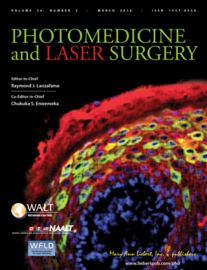A father and son are fighting over whether a laser therapy they describe as co-authors of a 2015 paper could be harmful to patients, prompting the journal to retract the article.
The small study suggested that the therapy could safely treat patients with glaucoma. But Tomislav Ivandic — the father — alleges that errors in how the study was reported could lead to harmful doses of laser light for patients receiving the therapy. His son and co-author, Boris Ivandic, maintains that the article is accurate.
To err on the side of patient safety, Photomedicine and Laser Surgery retracted “Effects of Photobiomodulation Therapy on Patients with Primary Open Angle Glaucoma: A Pilot Study.”
The retraction note explains the dispute:
[This retraction is] due to potentially significant errors in the reported parameters and calculated doses.
The second author of the article, Dr. Tomislav Ivandic, notified the Journal that inaccuracies in the reported parameters were discovered after publication of the article as a consequence of the information being translated from German (the authors’ native language) into English. As a very serious repercussion of this error, Dr. Ivandic states that, ‘‘Further studies or application based on these false doses would probably harm the eye.’’
The first-named author of the article, Dr. Boris Ivandic, disagrees with this declaration and states that, ‘‘there is no mistake in the dose calculations using the parameters 10 mW power, 3 mm2 beam spot area as well as 30 or 90 sec time of irradiation, respectively.’’
Photomedicine and Laser Surgery is dedicated to upholding the integrity of the science it publishes. As a result of this irreconcilable dispute between the authors, the editorial leadership of the Journal is officially retracting this article from the literature in an effort to reduce any potential for iatrogenic injury in the event that the erroneous information was used to study or treat other patients.
The authors regret this very unfortunate circumstance.
The article has been removed from the journal’s website. It is not yet indexed in Thomson Reuters Web of Science.
We’ve seen many disagreements between authors, for various reasons — but issues that pit co-authors who are father and son against each other are relatively rare.
The abstract notes that in the study, in which 38 patients received the treatment,
Adverse effects were not observed.
The editor in chief of the journal, Raymond Lanzafame, confirmed to us that no patients were harmed during the study:
The study did involve patients and, to the best of our knowledge and understanding, there were no issues of patient harm. The problem(s) had to do with the reporting of the parameters used and a disagreement about those specific numbers between the 2 authors.
He told us more of the backstory:
The paper was peer-reviewed and the parameters seemed to be reasonable. However, given the discrepancy and the apparent irreconcilable disagreement between the authors, we elected to retract the paper. We clearly did not want even the slightest potential that the parameters were indeed improper and could potentially result in patient harm if used by others.
The pair of Ivandics have published at least four other papers together in the journal Photomedicine and Laser Surgery. Both Ivandics affiliate themselves with the University of Heidelberg (more commonly referred to in English as “Heidelberg University”).
We asked Boris Ivandic about the disagreement. He maintained that the dose described in the paper is safe:
The calculations in the paper were correct and in agreement with the standards of the Journal. Using described treatment parameters everybody can confirm my calculations. There are no secrets.
He noted that his father,
is ophthalmologist and carried out described examinations and treatments. I did the statistics and wrote the paper.
He disagrees with the retraction:
In my view it was silly and over-hasty to retract the paper but this was done without letting me know.
The abstract of the paper explains that:
The purpose of this work was to study the safety of photobiomodulation therapy in patients with primary open angle glaucoma (POAG).
Photobiomodulation is also known as low-level laser therapy. According to the American Society for Laser Medicine and Surgery, it’s used to treat many conditions unrelated to the eye, such as chronic pain.
We asked the editor in chief if the therapy was currently used in clinical practice to treat eye issues:
PBM strategies are being used by some and are being investigated by others. To the best of my knowledge, there aren’t specific FDA clearances for PBM of the eyes.
Boris Ivandic sells a device called Treatlite to administer low-level laser therapy eye for diseases — an “off label” use of the therapy. It was not involved in this study.
Boris Ivandic explained that:
The Treatlite cannot be used for lowering intraocular pressure in primary open angle glaucoma. Treatlite is successfully used for degenerative retinal diseases like age-related macular degeneration, retinitis pigmentosa, central serous retinopathy.
We asked if he had evidence that it was safe for use on eyes:
The Treatlite is used for off-label therapy of above mentioned diseases only for 3 months now. I have documented each case. A case report and an independent study are currently under way. In the meantime testimonials of satisfied patients must suffice: www.power-your-vision-intl.
xobor.com.
We have reached out to Tomislav Ivandic for comment and will update this post with anything else we learn.
Like Retraction Watch? Consider making a tax-deductible contribution to support our growth. You can also follow us on Twitter, like us on Facebook, add us to your RSS reader, sign up on our homepage for an email every time there’s a new post, or subscribe to our new daily digest. Click here to review our Comments Policy. For a sneak peek at what we’re working on, click here.
